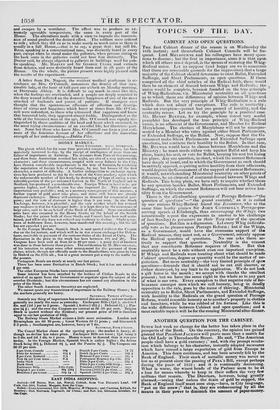TOPICS OF THE DAY.
CABINET AND OPEN QUESTIONS.
THE first Cabinet dinner of the season is on Wednesday the 16th instant; and thenceforth Cabinet Councils will be fre- quent. Lord isIELBovasiE and his colleagues have many ques- tions to discuss ; but the first in importance, since it is that upon which all others must depend, is the means of restoring the Whig- Radical union. Let us suppose (and happy are we to announce that there are reasonable grounds for the supposition) that a large majority of the Cabinet should determine to treat Ballot, Extended Suffrage, and Short Parliaments, as open questions. If these comprised all the chief articles of the Radical faith, there would then be no element of discord between Whigs and Radicals ; the union would be complete, because founded on the true principle of Whig-Radicalism, viz. Ministerial neutrality on all questions as to which there are differences of opinion between Whigs and Radicals. But the very principle of Whig-Radicalism is a rule which does not admit of exceptions. The rule is neutrality ; make an exception—permit but one ground of hostility, and the neutrality ceases. Let us try the principle by a practical case. Mr. HENRY BULWER, for example, whose recent very useful pamphlet has developed the true principle of Whig-Radical union, is an adherent of the Government, and Member fur Radical Marylebone. The electors of Marylebone will not be misrepre- sented by a Member who votes against either Short Parliaments, or Extended Suffrage, or the Ballot. Now, suppose that the Go vernment make Short Parliaments and Extended Suffrage open questions, but continue their hostility to the Ballot. In that case, Mr. BULWER would have to choose between Marylebone and the Ministry : he must needs either vote against Ballot and keep his place, losing his seat, or vote for Ballot, keeping his seat but losing his place. Any one question, in short, which the earliest Reformers have deeply at heart, and to which tile Government as such should be actively opposed, requiring active hostility from their adherents, would deprive the Government of the support of earnest Reformers; it would, notwithstanding Ministerial neutrality on other points of difference, be an element of continual discord between Whigs and Radicals. This being plain, we have only to inquire whether there be any question besides Ballot, Short Parliaments, and Extended Suffrage, on which the earnest Reformers will not bear active hos- tility from the Government. There is the all-absorbing question of Peerage Reform—"the question of questions"—" the grand essential," as it is called by our curious Whig-Radical friend the Examiner, who at the same time loudly praises Sir JOHN CAMPBELL'S Peerage-pre- serving speech at Edinburgh, thus encouraging the Whigs (we intentionally repeat the expressicin in answer to his challenge of last Sunday) to persevere in their Tory view of the question of questions. But this is a digression. Let every Whig individu- ally vote as he pleases upon Peerage Reform ; but if the Whigs, as a Government, would have the strenuous support of the Radical masses, they must not, as a Government, actively oppose the Radical question of questions. No one asks them ac- tively to support that question. Neutrality is the utmost that any considerate Reformer requires of them. But this neutrality must be a rule without even one important exception. If Whigs and Radicals were treating about what should be made Cabinet questions, degree or quantity would be the matter of ne- gotiation. But mere neutrality—the very limited principle of open questions—demands that it should not be cut still shorter, or rather destroyed, by any limit to its application. We do not look a gift horse in the mouth ; we accept with thanks the smallest present ; but we have the same right to the whole as to any part of what is our own. Every exception to that negative rule of for- bearance amongst men which we call honesty, being in deadly opposition to the rule, goes by the name of thieving. Ministerial neutrality as to Ballot, Short Parliaments, and Extended Suffrage, with hostility to the Radicals on the grand question of Peerage Reform, would resemble honesty as to another's property in clothes and furniture, while he was robbed of his fortune. Like this is the wide difference between Cabinet and open questions; and a most suitable topic it will be for the coming Ministerial after-dinner.


























 Previous page
Previous page